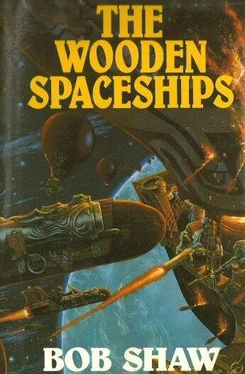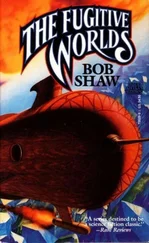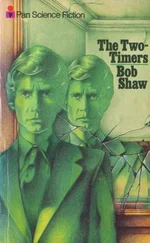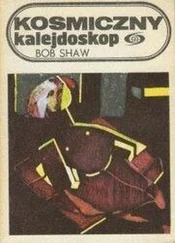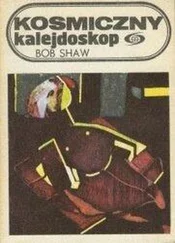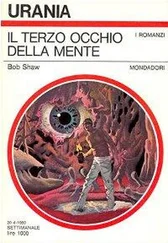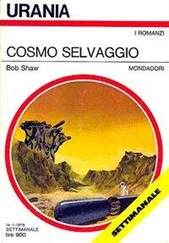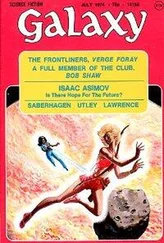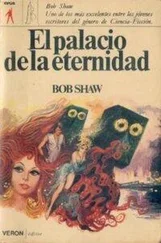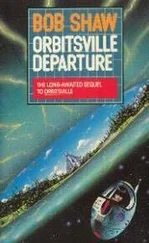Bob Shaw - The Wooden Spaceships
Здесь есть возможность читать онлайн «Bob Shaw - The Wooden Spaceships» весь текст электронной книги совершенно бесплатно (целиком полную версию без сокращений). В некоторых случаях можно слушать аудио, скачать через торрент в формате fb2 и присутствует краткое содержание. Год выпуска: 1988, ISBN: 1988, Издательство: Gollancz, Жанр: Космическая фантастика, на английском языке. Описание произведения, (предисловие) а так же отзывы посетителей доступны на портале библиотеки ЛибКат.
- Название:The Wooden Spaceships
- Автор:
- Издательство:Gollancz
- Жанр:
- Год:1988
- ISBN:0-575-03894-2
- Рейтинг книги:3 / 5. Голосов: 1
-
Избранное:Добавить в избранное
- Отзывы:
-
Ваша оценка:
- 60
- 1
- 2
- 3
- 4
- 5
The Wooden Spaceships: краткое содержание, описание и аннотация
Предлагаем к чтению аннотацию, описание, краткое содержание или предисловие (зависит от того, что написал сам автор книги «The Wooden Spaceships»). Если вы не нашли необходимую информацию о книге — напишите в комментариях, мы постараемся отыскать её.
, the survivors of Land bring an ultimatum—submit or die of the Plague.
The Wooden Spaceships — читать онлайн бесплатно полную книгу (весь текст) целиком
Ниже представлен текст книги, разбитый по страницам. Система сохранения места последней прочитанной страницы, позволяет с удобством читать онлайн бесплатно книгу «The Wooden Spaceships», без необходимости каждый раз заново искать на чём Вы остановились. Поставьте закладку, и сможете в любой момент перейти на страницу, на которой закончили чтение.
Интервал:
Закладка:
The sergeant responded with a malevolent stare, his lips twitching as he debated making a reply. Toller gave him a nod of mock politeness, brought his mount around and put it into a fast canter. It was about four miles to Kolcorron’s major city, and he could expect to be there at least an hour ahead of Gnapperl and his squad. Toller glanced up at the vastness of the sister planet, poised directly above him and occupying a large arc of the sky, and knew by the width of its sunlit crescent that he would be in good time for his appointment. Even with Spennel’s release to be negotiated he could still complete his mission and reach home again before the sun vanished behind the Old World—provided that the King was in a reasonable frame of mind.
The best approach, he decided, would be to play on Chakkell’s antipathy towards the idea of his noblemen extending their territories. When the new state of Kolcorron had been founded, Chakkell—the first non-hereditary ruler in history —had sought to protect his position by severely limiting the size of aristocrats’ domains. There had been some resentment, especially among those related to the old royal family, but Chakkell had dealt with it firmly and, in some cases, bloodily. Toller had been too busy to pay much attention.
Those early years now had a dreamlike quality in his memory. He could no longer readily visualise that wavering line of sky-ships, a stack a hundred miles high, drifting down from the zenith after the interplanetary crossing. Most of the craft had been dismantled soon after the landing, the balloon fabric going to make tents for the settlers, or in some cases being restitched to create envelopes for airships. On a whim of Chakkell’s a number of the skyships had been preserved intact to form the basis of museums, but Toller had not viewed any of them in a long time. The inert, mould-encrusted reality of the ships was incompatible with the inspirational dynamism of that high point in his life.
On surmounting a fold in the land he saw the city of Prad in the distance, its centre cradled in the bend of a wide river. The city presented a strange appearance to his eye because, unlike Ro-Atabri where he had grown up, its origins lay in an abstraction, an architectural strategy. A cluster of tall buildings marked the core, oddly circumscribed and highly visible amid the green horizontals of the landscape, while the rest had only an attenuated existence. Patterns of future avenues and plazas were sketched on the terrain, sometimes with lines of timber dwellings, but for the most part with nothing more than posts and white-painted boulders. Here and there in the suburbs a stone-built official structure brought the plan a step closer to reality, each building suggestive of a lonely outpost under siege from armies of grass and scrub. In many areas nothing moved but the bubble-like ptertha, gently bounding across the open ground or nuzzling their way along fences.
Toller followed the straight highway into the city, a place he rarely visited. He passed increasing numbers of men, women and children who were on foot, and in the central section found a bustling atmosphere reminiscent of a market town on the Old World. The public buildings were in the traditional Kolcorro-nian style—featuring overlapping diamond patterns in varicoloured masonry and brick—which had been modified to suit local conditions. Deep red sandstone should have been used to dress all corners and edges, but no useful sources had yet been found on Overland and the builders had substituted brown granite. Most of the shops and hostelries had been deliberately made to resemble their Old World counterparts, and in some areas Toller found it almost possible to imagine himself back in Ro-Atabri.
Nevertheless, the rawness and lack of finish of many structures reinforced his opinion that King Chakkell had tried to do too much too soon. Only twelve thousand people had successfully completed the journey to Overland, and although they were multiplying rapidly the population of the entire planet was less than fifty thousand. Many of those were very young and—as a result of Chakkell’s determination to create a world state—were scattered in small communities all around the globe. Even Prad, the so-called capital city, housed less than eight thousand, making it a village uncomfortably glorified with the trappings of government.
As he neared the north side Toller began to catch glimpses of the royal palace on the far bank of the river. It was a rectangular building, architecturally incomplete, waiting for the wings and towers which even the impatient Chakkell had to entrust to future generations. The white and rose-coloured marble with which it was clad gleamed through ranks of immature trees. Within a few minutes Toller was crossing the single ornate bridge which spanned the river. He approached the brakka wood gates of the palace itself, where the chief of the guard recognised him and signalled that he should pass through unimpeded.
In the forecourt of the palace there were about twenty phaetons and as many saddled bluehorns, an indication that this was a busy foreday for the King. It occurred to Toller that he might not get to see Chakkell at his appointed hour, and he felt a sudden stirring of anxiety on Spennel’s behalf. The threat he had issued to the sergeant would cease to be effective in the presence of an executioner and high officials carrying death warrants. Toller dismounted, unstrapped the presentation case and hurried to the arched main entrance. He was admitted by the outer guards quickly enough, but—as he had feared—was stopped at the carved door of the audience chamber by two black-armoured ostiaries.
“I’m sorry, my lord,” one of them said. “You are required to wait here until the King bids you enter.”
Toller glanced at the other people, some of whom were wearing the sword-and-plume insignia of royal messengers, who were standing about the corridor in groups of two or three. “But my appointment is for the ninth hour.”
“Others have been in attendance since the seventh hour, my lord.”
Toller’s anxiety increased sharply. He paced a circle on the mosaic floor while he came to a decision and then, making a show of seeming relaxed and untroubled, returned to the guards. When he engaged them in Smalltalk they looked gratified, but not unduly so—their control of that particular doorway had enhanced their standing with many petitioners. Toller conversed with them for several minutes and was just beginning to have difficulty in dredging up suitable trivia when footsteps sounded on the far side of the double door.
Each ostiary swung upon a leaf and a small group of men dressed in commissioner’s robes emerged, nodding in evident satisfaction at the outcome of their meeting with the King. A white-haired man who looked like a district administrator stepped forward, obviously expecting to be ushered into Chakkell’s presence.
“My apologies,” Toller murmured, moving ahead of him. The startled ostiaries tried to bar the way, but even in his early fifties Toller retained much of the speed and casual power which had distinguished him as a young soldier, and he thrust the two men aside with ease. A second later he was striding through the high-ceilinged room towards the dais upon which Chakkell was seated. Chakkell raised his head, alerted by the clattering of the ostiaries’ armour as they came in pursuit of Toller, and his expression changed to one of anger.
“Maraquine!” he snapped, heaving himself to his feet. “What is the meaning of this intrusion?”
“It’s a matter of life or death, Majesty!” Toller allowed the guards to seize him by the arms, but resisted their attempts to draw him back to the door. “An innocent man’s life is at stake, and I beg you to consider the matter without delay. Also, I suggest that you order your doorkeepers to withdraw—they would be of little value were I obliged to separate their hands from their wrists.”
Читать дальшеИнтервал:
Закладка:
Похожие книги на «The Wooden Spaceships»
Представляем Вашему вниманию похожие книги на «The Wooden Spaceships» списком для выбора. Мы отобрали схожую по названию и смыслу литературу в надежде предоставить читателям больше вариантов отыскать новые, интересные, ещё непрочитанные произведения.
Обсуждение, отзывы о книге «The Wooden Spaceships» и просто собственные мнения читателей. Оставьте ваши комментарии, напишите, что Вы думаете о произведении, его смысле или главных героях. Укажите что конкретно понравилось, а что нет, и почему Вы так считаете.
